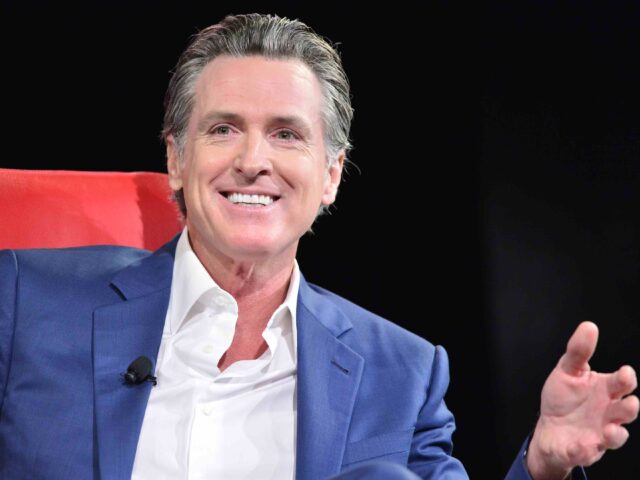California Gov. Gavin Newsom (D) signed forty-four new laws this week, according to an announcement by his office.
They span an astonishing variety of subjects, from the number of beekeepers on the Apiary Board to the use of telehealth in blood drives.
Just one week ago, Newsom signed another forty new laws dealing with climate change. There were a few major new rules, such as requiring California to reach 90% “clean” energy by 2035. The rest were a blinding barrage of detail that no one has read, much less mastered.
Politicians in California’s Democrat-dominated legislature are good at passing laws. What they are not good at is keeping the lights on — or supplying water to residents, keeping crime under control, preventing homelessness, stopping sewage dumps into the San Francisco Bay, building affordable housing, keeping gas prices at reasonable levels, and teaching children to do more than name their pronouns. They excel in translating their utopian visions into legislative language. They fail at doing the basic tasks of government.
California is the world’s fifth-largest economy, but cannot supply enough electricity to meet its residents’ needs. That is not a natural outcome of economic or population growth; rather, it is the result of a decision by lawmakers to push the state toward solar and wind power before they can make up for the elimination of natural gas and nuclear power from the state’s supply. The state will compel drivers to buy electric cars in 2035– but had to warn drivers earlier this month not to charge them during periods of high demand.
That is what happens in a one-party state, when the ruling party has little fear of being held accountable by, much less being replaced by, the opposition. The quantity of laws grows; the quality of laws declines. The wealthy are satisfied, because they operate beyond the law — like Gavin Newsom, dining at the French Laundry. The poor are unmoved, since their primary concern is survival, law or no law. The burden of complying with the law, just like paying the taxes, falls on the state’s disenfranchised, dwindling middle class.
Given the sheer number of recent laws, perhaps Californians should be grateful that Democrats’ ideas were actually put to some kind of vote, rather than simply imposed on the population, like the California Air Resources Board (CARB) mandates. The CARB’s latest proposal is to prohibit natural gas heaters and furnaces by 2030. They want people to use electric heat pumps instead — a new technology that almost no one uses yet, and which will place more strain on an electrical grid that can’t cope with existing needs.
Once in a while the legislature does something useful — when it has exhausted every other possibility. Last month, on the eve of the statewide energy crisis, it voted to extend the life of California’s last nuclear plant, the Diablo Canyon facility, by an additional five years. And California’s politicians often have the good sense to let voters make the worst decisions for themselves: we are still living with the consequences of Proposition 47, a referendum on criminal justice “reform” that has fueled the state’s ongoing crime wave.
When I saw Newsom’s press releases this week, I was reminded by a display in South Africa’s parliament, nearly two decades ago. I was working as a speechwriter for the leader of the opposition when, in celebration of ten years of democracy, the ruling party hung impressively large banners at the entrance to the legislature, listing all of the laws it had passed. Outside the complex, South Africa was becoming an increasingly lawless society, with crime in the streets and corruption in the boardrooms. But on paper, it was great.
Today, South Africa suffers chronic electricity shortages, thanks to poor planning, corruption, and aggressive affirmative action that chased engineers out of the jobs (and out of the country). It has a splendid constitution, with guarantees of socioeconomic rights that make American liberals jealous. Yet for the past decade, that constitution has basically been an afterthought, as the country has been mismanaged by a shadowy network of corrupt businessmen and politicians to whom ambitious lists of laws mean absolutely nothing.
California is not South Africa: the ingenuity of Silicon Valley and the creativity of Hollywood are continuing to attract talent and to generate wealth, even as small business owners and would-be homeowners seek better, and safer, opportunities elsewhere. The gas price is $2 per gallon more than the national average; the tents cities sprawl through beachfront communities; but the state remains beautiful enough, and free enough, for many people to cultivate their own little bit of paradise — as I have, on my Palisades hillside.
Yet South Africa and California have the same basic weaknesses. They are both increasingly unequal societies, despite embracing ideologies that aim at radical equality. They are also, thanks partly to natural beauty, burdened by utopian environmentalism — absurdly so in South Africa’s case, which needs growth to lift millions out of poverty.
California, like South Africa, lacks the political will to pull itself out of decline. We await a generation of leaders who will take pride in repealing laws rather than making them.
Joel B. Pollak is Senior Editor-at-Large at Breitbart News and the host of Breitbart News Sunday on Sirius XM Patriot on Sunday evenings from 7 p.m. to 10 p.m. ET (4 p.m. to 7 p.m. PT). He is the author of the recent e-book, Neither Free nor Fair: The 2020 U.S. Presidential Election. His recent book, RED NOVEMBER, tells the story of the 2020 Democratic presidential primary from a conservative perspective. He is a winner of the 2018 Robert Novak Journalism Alumni Fellowship. Follow him on Twitter at @joelpollak.

COMMENTS
Please let us know if you're having issues with commenting.